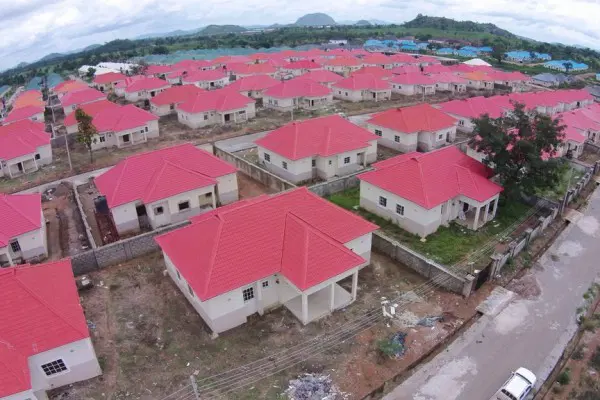
•Apathy triggers 96% fall in investment •Arbitrary CoO revocations, regulatory bottleneck, others driving apathy- Stakeholders�
Efforts to close the N21 trillion housing gap in Nigeria is under fresh threat as Pension Funds Administrators, PFAs, have slashed investment in the real estate sector by 91.6 per cent in five years.
Financial Vanguard findings revealed that the increasing apathy to real estate investment by PFAs is due to many factors mainly, arbitrary revocation of Certificate of Occupancy, CoO, by state governments, regulatory bottlenecks, naira depreciation and macroeconomic headwinds.
Pension and real estate experts stressed that these factors, among other things, have discouraged institutions from setting up Real Estate Investment Trust, RIETs, which have been major channel through which PFAs and other institutions invest in the real sector.
Financial Vanguard findings show that Nigeria constructs about 600,000 fewer homes than needed, which over the years has led to a 20 million housing deficit, and the deficit is still growing.
According to the Vice President, Senator Kashim Shettima, the country needs about N21 trillion to overcome the rising housing deficit.
Financing the housing gap
Efforts to address the housing gap by enhancing investment in the real sector, led to the introduction of REITs in 2007 by the Securities and Exchange Commission, SEC.
REITs are corporations or trusts that use the pooled capital of many investors to purchase and manage income property and/or mortgage loans. By investing in a REIT, investors benefit from the rental income generated by the properties without the burden of directly managing them.
According to experts at Banwo and Ighdalo, key advantages of REITs include access to finance for investment in real estate, professional management of real estate assets or projects and an opportunity for investors participate in real estate financing without getting involved in the day-to-day management of real estate processes.
As a result, REITs became an attractive and major sources of real estate investment channel for PFAs. This led to upward trend in PFAs investment in REITs between 2018 and 2020.
According to data from Pension Fund Operators Association of Nigeria, PenOp, PFA investment in REITs rose by 7.3 per cent per cent to N22.4 billion in 2019 from N20.86 billion in 2028. The trend continued with an upsurge of 968 per cent per cent to N239.28 billion in 2020.
However, this trend was reversed from 2020 to 2024, as PFAs investment in REITs nosedived.
Reflecting this trend reversal, data by PenOp showed that PFAs investment in REITs fell by 91.6 per cent to N20.06 billion in 2024 from N239.28 billion recorded in 2020.
Year-on-Year, YoY, trend details show that PFAs’ investment in REITs fell by 35.8 per cent to N153.52 billion in 2021. It further declined in 2022 by 90.8 percent to N14.14 billion, before adding 48.8 percent to N21.94 billion in 2023.
Unfortunately, in 2024, the figure reversed the previous year’s growth to decline by 4.7 per cent to N20.06 billion from N21.04 billion recorded in 2023.
Experts’ opinion
Speaking on the development, Pension Fund Operators Association of Nigeria, PenOp, noted that the gradual drop in investment in REITs is due to the dearth of REITS available in the market.
PenOp stated: “Primarily, there are two ways pension funds invest in real estate, one is direct investment and the second is through Real Estate Investment Trusts (REITs).
“The gradual drop in investment in REITs is due to the dearth of REITS available in the market. However, active funds have shifted to investing in real estate through Private Equity Funds.”
Also speaking, Mr. Obinna Lewis-Asonye, Micro Pension Manager, Stanbic IBTC Pensions, stated that some institutions did not come up with REITs because of the uncertainty in the real estate market.
He said: “For REITs, a lot of institutions did not come up with real estate trust because of the uncertainty in the real estate market. Also, some companies did not get institutionalized approvals from the Securities and Exchange Commission, SEC, because SEC gives the go ahead for investment in Nigeria. So SEC versus the institutions did not bring out lots of real estate investments.
“However, in the absence of REITS, companies are pursuing infrastructure fund to invest in infrastructure and power apart from residential mortgage. This is because residential mortgage is open to its issues such as we have seen in the revocation of Certificates of Occupancy happening in the country and it is very dicey. For residential mortgage, the approval and documentation process is just tiring and can drive one crazy. So companies are looking at power, infrastructure, which includes access roads, affordable and sustainable power.
“Another issue is that PenCom’s strict investment guidelines stipulate that there are certain parameters to get pension investments grade. So institutions are finding it hard to keep up to that. Any institution that brings out an investment that is not pension investment ready has taken away that major institutional investor because PFAs have their monies to invest.
“However, I believe that within the year, the opportunities in REITs will open up. PenCom will probably bring up more investment friendly criteria so that we just don’t come up with any investment that will filter away people’s money.”
Also speaking, Mr. Michael Simire, an Urban Planner and environmentalist stated that investment in REITs is also being affected by the naira devaluation and the worsening economic situation of the country.
He said: “Consequently, money might not be readily available in the market to invest, thereby leading to the decline being experienced in REITs. Another factor affecting REITS is the prevalence of vacant properties across the country.
“If you go to a lot of places now, you will see lots of vacant properties. Office spaces, residential spaces are just vacant. So the economic situation is really affecting the real estate and mortgage sectors.
“Also, the economic situation is negatively affecting the purchasing power of Nigerians leading to high number of undeveloped properties across the country.
So many land owners are experiencing declining financial situations and have not been able to develop their properties. Others bought properties with intention to resell and they will hold on for years so that the properties can appreciate. So all these have negative effects on REITS because once properties are allocated, they are supposed to be developed and sold. And such properties are supposed to be acquired immediately and occupied so that income will be generated and continue to circulate.
“But where properties are not developed for years, the government might come in to revoke the CoO, which on its part scares away investors from the real estate sector. While the government is only trying to implement the law that you are supposed to develop your land within a specific period after your allocation, revocation of CoO is making investors stay clear from properties or areas that they feel government has control over or is interested in. But government wants all areas to develop, that is why they prefer to allocate to people that are well to do, who are willing to develop within a few years. Unfortunately, such action negates the policy of housing for all.
“But I believe that as time goes on, the sector will weather the storm because it has the resilience to recover appreciably compared to other sectors. So the sector could be going through a difficult time right now but it will recover eventually.”
On ways of boosting investment in REITs and growing the mortgage sector, Director, Centre for Pension Rights Advocacy, Mr. Ivor Takor stated: “Government should take measures to execute acceptable programmes for Nigerians to access affordable housing by securing a regular and continuous provision of the necessary financial means.
“Nigerians should have access to loans at moderate interest rates and such facilities should be supplemented by other suitable methods of direct and indirect financial assistance such as subsidies, tax concessions, and appropriate private, co-operative and public owning of housing.”
For Principal Partner of M.I Okoro and Associates, Chief Meckson Innocent Okoro, the economic situation of the country has caused a low demand for residential mortgage which has affected the creation of REITs.
He said: “Companies are reprioritising their investment portfolio due to the harsh investment climate in the country. The way the economy is now, demand is not high in real estate sector as well as even supply. Even when there is supply, it is not as much as it used to be because the high exchange rate has pushed up the cost of everything in the sector. Consequently, the price and demand for real estate is not in the reach of an average investor. So it is only very few people who have huge money that go into real estate right away.
“Also, the long payback period is discouraging investors from the sector. REITs are not being created because if the price of a real estate is too high, the payback period will also be too long. For instance, if a property that used to cost say N30 million now costs N90 million because of the way things are going in the country, if the payback period would have been in five years time, now you are looking at 15 years time.”
SOURCE;VANGUARD




